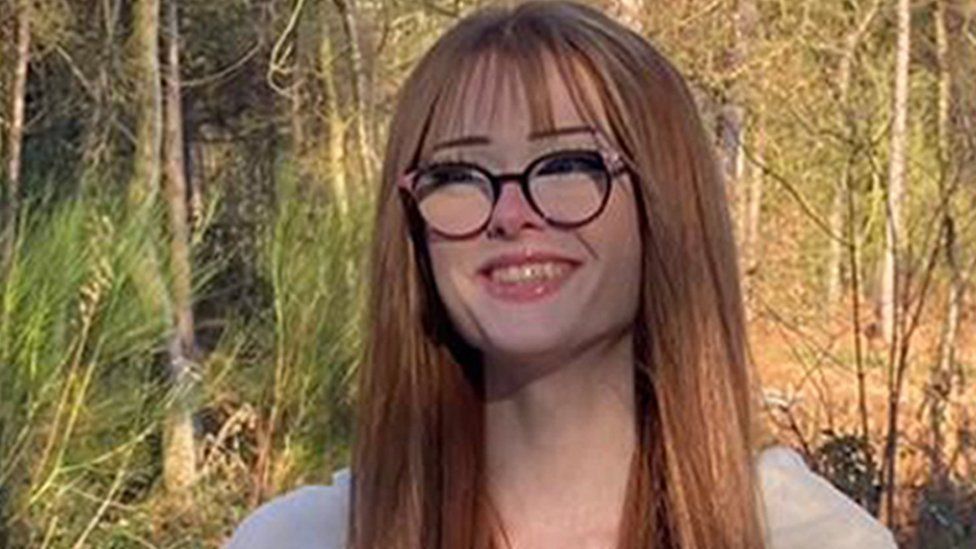Why teenagers who killed Brianna Ghey can be named
- Published

Brianna Ghey died after being repeatedly stabbed in Culcheth Linear Park
Two teenagers who murdered 16-year-old Brianna Ghey after devising a "kill list" of children to target have been named for the first time.
Brianna, who was transgender, was stabbed 28 times in a "frenzied" attack in a Cheshire park on 11 February 2023.
A ban on identifying Scarlett Jenkinson and Eddie Ratcliffe had been in place since they first appeared in court.
Following their conviction in December, the judge agreed to lift anonymity when the two 16-year-olds were sentenced.
Jenkinson was given a 22-year minimum term, while Ratcliffe will be detained for at least 20 years.
Before their sentencing at Manchester Crown Court, a charity warned that naming child killers could be unhelpful.
A ban on identifying Jenkinson and Ratcliffe had been in place since they first appeared in court
Children appearing in youth or crown courts in England and Wales - whether as a victim, witness or defendant - generally cannot be identified.
This was the case during the trial of Jenkinson and Ratcliffe, who were accused of attacking Brianna in Culcheth Linear Park in Warrington.
Journalists covering the proceedings were banned from publishing their names and other identifying details, including photographs and the school they attended.
This restriction was imposed because of their ages - they were both 16 during the trial but 15 at the time of the attack.
As a result, the media could only refer to them as Girl X and Boy Y.
After they were convicted of her murder, the teenagers' legal teams opposed an application by the media to name them, citing possible welfare concerns.
They also warned about the consequences for their families, including death threats received by Girl X's family.
Brianna was lured to Culcheth Linear Park before being murdered
However Mrs Justice Yip said there was "a strong public interest in the full and unrestricted reporting of what is plainly an exceptional case".
"The public will naturally wish to know the identities of the young people responsible as they seek to understand how children could do something so dreadful," she added.
"Continuing restrictions inhibits full and informed debate and restricts the full reporting of the case."
The legal dilemma
Andrea Coomber KC, the chief executive of the Howard League for Penal Reform charity that campaigns for "less crime, safer communities and fewer people in prison", said she was generally against the idea of the identities of convicted young people being published.
"The naming of them and the shaming of them is a barrier to rehabilitation," she said.
"It creates troubles for their safety in prison and upon release because these are children at the end of the day.
"They need to be given the space to grow and to move beyond their crime."
James Bulger was abducted at a shopping centre in Bootle and beaten to death
Sir Richard Henriques led the prosecution of the killers of Merseyside toddler James Bulger.
As 10-year-olds in 1993, Jon Venables and Robert Thompson took James from a Bootle shopping centre before torturing and killing him.
Sir Richard said the correct decision had been made by Mrs Justice Yip in Brianna's case because it was so shocking and exceptional.
"The public interest here requires or allows parents, grandparents, godparents, aunts and uncles to say to themselves, could this happen in our family?" he said.
"Are our children acquiring the correct values, the right values, our values? Could they view such things on the internet? How are they spending their spare time?
"Could our children lure somebody by lies into a park and then knife them to death? Are they members of the right organisations - should they join the cadets, the youth club and so on?
"That is the question that hundreds of thousands of families in this country will be asking of themselves when these facts are published with total inhibition."
He said there was "much good to follow" if cases such as Brianna's murder were examined fully.
The case of Ann Maguire
Ann Maguire had taught Spanish at Corpus Christi Catholic College for more than 40 years
Ann Maguire was murdered by one of her pupils in 2014 while teaching a Spanish class in her Leeds secondary school.
Will Cornick, who was 15 at the time, stabbed the 61-year-old to death in front of her students.
His identity was withheld until reporting restrictions were lifted after he pleaded guilty to the charge.
Mrs Maguire's sister, Denise Courtney, said: "It's important these people are named because they've committed such an evil, premeditated, heinous crime against a defenceless human being - they've taken a life.
"When it happened to us, we needed to know all the facts and know who this person was and what he looked like to give us some form of closure.
"If by naming someone and putting their details out there in the media, if that prevents one other person from committing a similar crime then it's worth the fact they are named."
Why not follow BBC North West on Facebook, external, X, external and Instagram, external? You can also send story ideas to northwest.newsonline@bbc.co.uk, external
Related Topics
- Published2 February
- Published2 February
- Published2 February
- Published20 December 2023